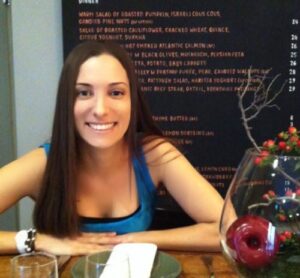Medical school is a grueling, pressure packed degree program that is longer than an Olympic cycle. There are significant lessons in mental toughness that athletes and all individuals in the pursuit of excellence can learn from successful med school students. To find out what it takes, I sat down with my brilliant twin sister, Carly Longbottom, who recently graduated with honours from medical school at the University of Western Australia.
In the pursuit of excellence, an incredible amount of focused effort is required. Here is a glimpse into Carly’s daily schedule over a 4.5 year period.

Carly
Monday to Friday, lectures successively 8am – 5pm .
- Study 2-3 hours in the evening.
- Saturday study from 9am – 5pm, and 2-3 hours in the evening.
- Sunday study 8am – 12pm, with half a day off in the afternoon.
- Goes to bed between 10pm and 10:30pm.
Final 2 years:
- Hospital rotation and emergency service 7am – 7pm, weekend 7:30am – 10pm and night shifts 10pm – 9am.
Your schedule required a great deal of commitment with little time off, how did you keep motivation high to study and not let procrastination take over?
Carly: I did procrastinate here and there, mainly with cleaning. My house was spotless during my degree program. But I didn’t let it happen for too long.
I had this motivation that if I didn’t put in the hours, I wouldn’t pass. It wasn’t the most inspiring of thoughts but it was the reality of the situation that kept me focused.
Everyone in the program is smart, no one is special, and putting in long hours of focused study was a requirement, not an option.
Like the most successful athletes and individuals in the world, Carly had a deep understanding of the work required to achieve the end goal. The recognition that there are no short cuts and the “I’ll will do it later” attitude simply isn’t an option. It is a “realist” mentality. At the top, everyone is talented and what separates effective individuals from the mainstream is the commitment to working hard consistently, not just when you feel inspired.
Handling Intense Pressure
One of the most pressurizing aspects of medical school is the oral examination process known as, the VIVA. Unlike traditional exams, you cannot deal first with the questions you know best and come back later to the ones you are not so sure about; and you cannot cross out previous answers and rewrite them. Candidates are expected to present answers verbally to challenging medical cases across an immense spectrum of knowledge, under time pressure. As you can imagine, high levels of anxiety and stage fright are common.
You don’t have time to think, it has to be instinctual…it is a performance.
How did you manage your nervousness and the pressure of oral examinations?
Carly: I got really nervous for exams, but everyone in the programs does. Real practice of the exam; verbally practicing responses to cases really helped me to manage my nervousness and feel confident. With this type of preparation, the process becomes more automatic and habitual.
No matter how much study I had to do, getting 8 hours of sleep a night was a priority that helped me manage everything better. Sleep is also important for consolidating information into memory.
Before exams, I spent time visualizing the setting of the exam room, the examiner in front of me, and seeing myself present my answers calmly, standing with confidence and making eye contact.
The most decorated Olympic athlete in history, Michael Phelps has extensively trained himself to visualize both good and bad circumstances. Phelps imagines himself racing from the stands, then the pool, and goes through all possible scenarios like, his goggles falling off or suit ripping, essentially programming his nervous system to respond well to anyone of these scenarios.
The “real exam practice” Carly refers to is called simulation training in sport and has been proven as a crucial aspect of competition preparation for elite athletes competing in big events. For example, the US Gymnastics team is known to practice their full routines in their competition leotards before major events and simulate as much of the competition experience as possible. Basketball and volleyball players are known to simulate crowd noise in pre-competition training to practice distraction control.
This form of preparation allows athletes to “compete like they train,” making sure big events don’t feel like a jolt to the system, but instead a familiar, automated process. When the stakes are high and nervousness is amplified, your mind and body need to feel connected to a performance process that feels natural.
What do you think separates those who make it in medical school and those who drop out?
Carly: Commitment, discipline, and sacrifice are really important. I missed out on a lot of birthday parties and outings with friends in the past 4-years. But it’s just what you have to do to get through it, and it’s not forever. I enjoy being disciplined; I like the feeling of accomplishment it gives me.
The students who dropped out were all intelligent and capable, but lacked self-confidence. They let the self-doubt get the better of them.
Carly: Everyone in the program has doubt at same stage, because the course pushes you to your limits, especially during the exam period. Taking a break from studying when worry crept in and going for a jog would help, but support from family was the most important. You need encouragement and positive people around you when you lose perspective. Sharing my feelings and “taking in” the reassurance is important for coping with the stress and demands.
For young student-athletes in the pursuit of big dreams, don’t underestimate the power of a support network when you are out of comfort zone. Reach out when you feel over-whelmed and be open and receptive to encouragement.
To learn more about how to enhance discipline and focus in your goal pursuits visit Dr Jay-Lee today.







